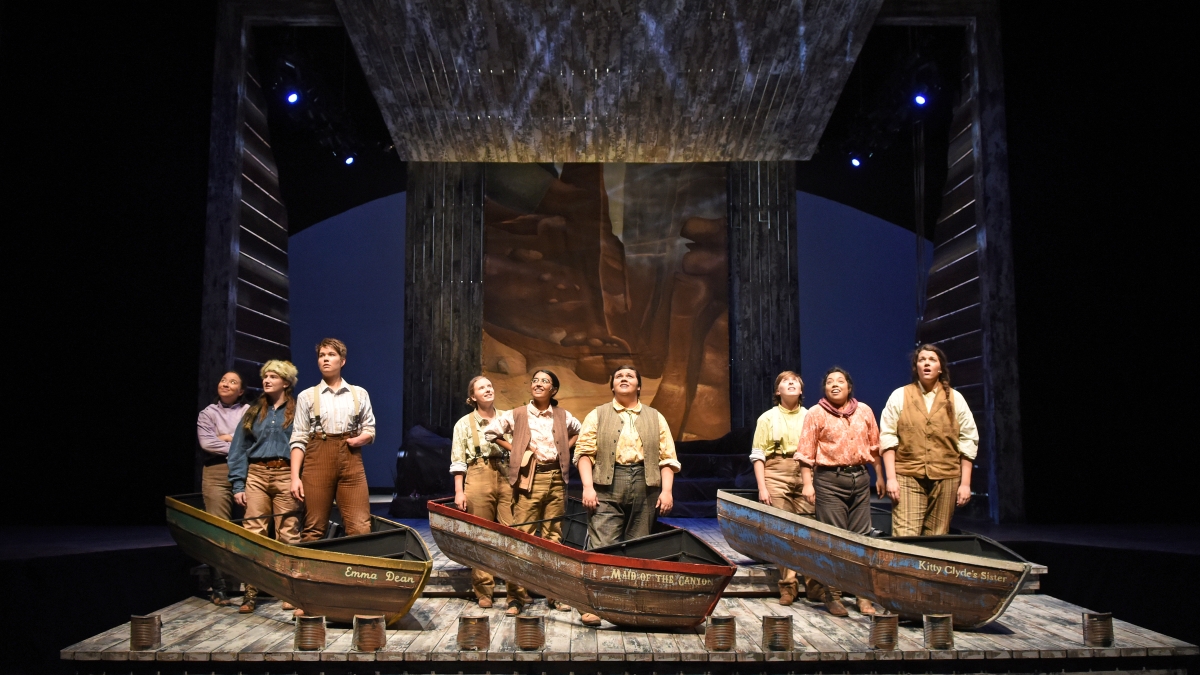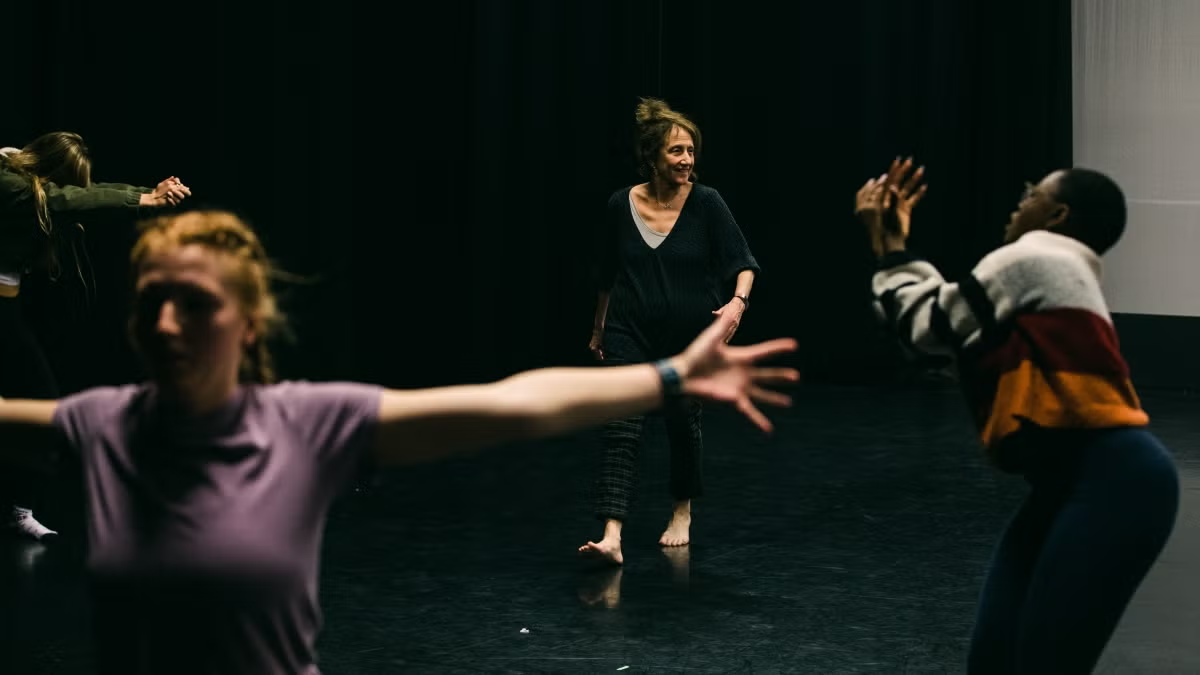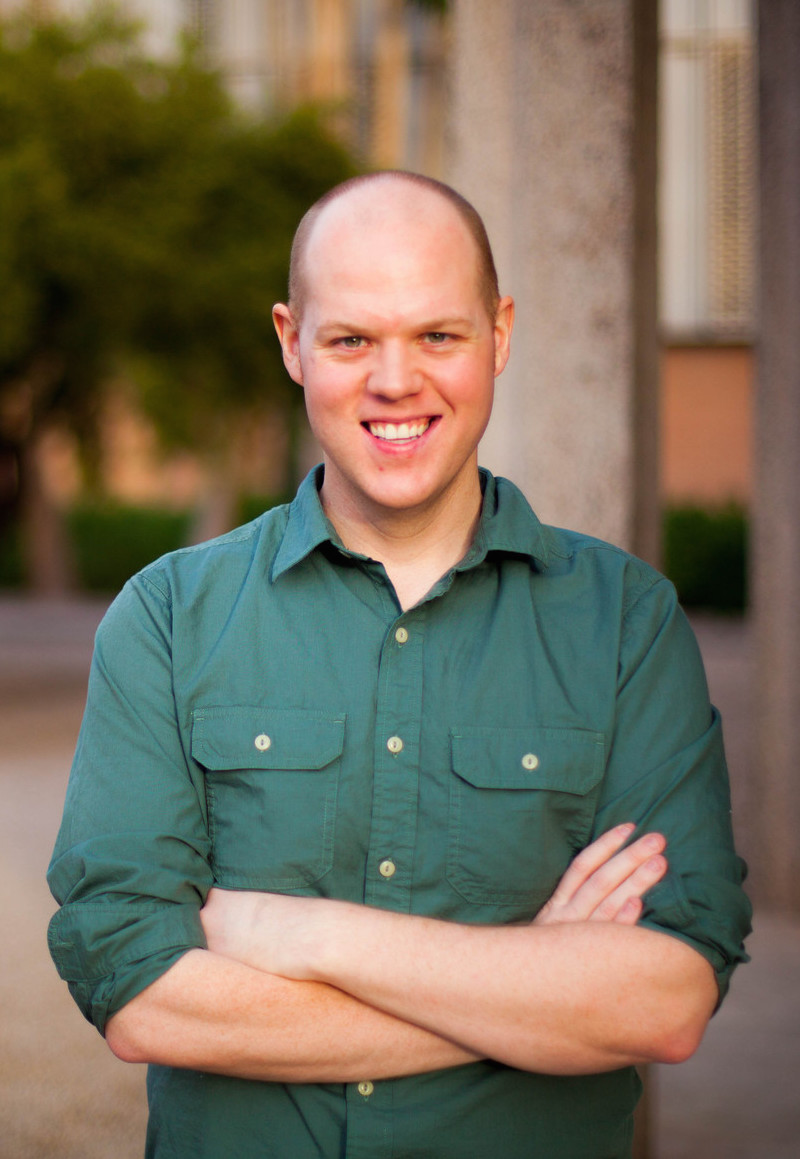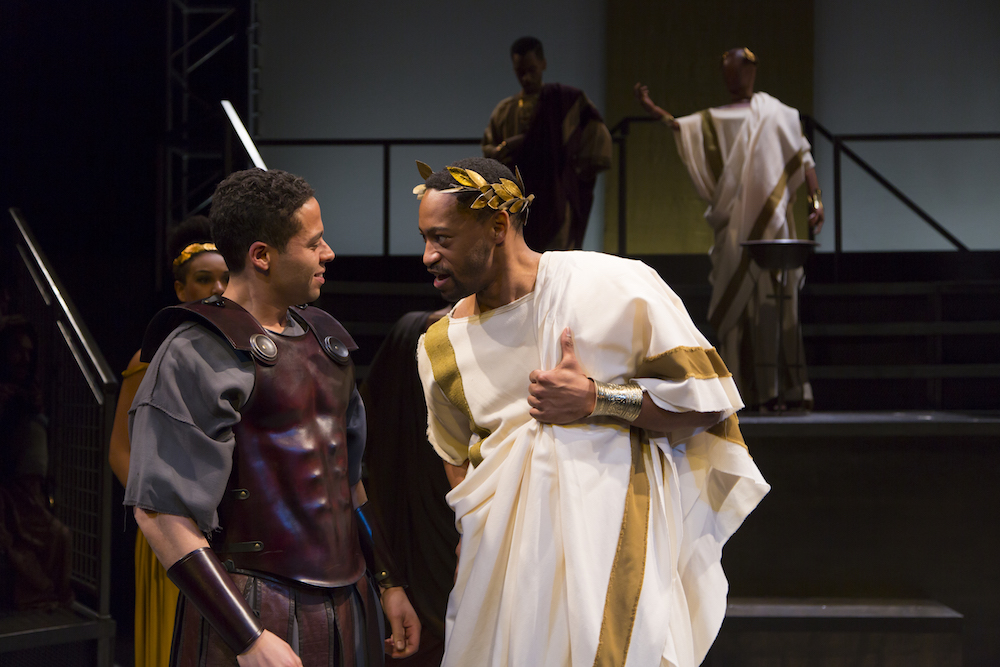Herberger Institute changes narratives with thought-provoking theater

With an all-black production of Shakespeare, an all-female production of “Men on Boats” and a new play about race, bias and “who the f--- has the right to tell whose story,” ASU’s Herberger Institute has prompted critical evaluations of some of the trickiest issues facing the nation today.
The productions show the value of art as a way to share experience, challenge stereotypes and misconceptions, and function as catalyst for change.
“The stories we tell, and the representations we create through art can transform the world we live in and help us to see and the imagine the change we want in the rest of society,” said Lance Gharavi, associate professor and artistic director in the School of Film, Dance and Theatre in the Herberger Institute for Design and the Arts.
Gharavi said creative storytelling can offer a different point of view, push a political idea or bolster social justice.
“Fifty years ago, it wouldn’t have been plausible to have a national conversation about whether or not gay people could marry one another,” Gharavi said. “They weren’t even in our stories, and we didn’t have representations of them.”
Gharavi points to the popular TV series " Will and GraceThe Emmy-Award winning sitcom aired on NBC from 1998 to 2006. " as having done “a lot of heavy cultural lifting” by telling stories that reflect society and producing a social reality for others to see.
When it’s difficult to tell others how you might feel, art can show it. Jericho Thomas, a playwright, screenwriter, actor and 2017 MFA Dramatic Writing candidate at Herberger, recently put this idea to the test.
A self-described “white, Christian male,” Thomas decided he was going to pen a play about “the black experience.” The result was “Writes,” a frank, new play on narrative ownership, misrepresentation of blacks in fiction and the loss of white privilege — and “race, bias and who the f--- has the right to tell whose story.” It was co-hosted last month by the ASU Center for the Study of Race and Phoenix’s Black Theatre Troupe.
Herberger MFA Dramatic Writing candidate Jericho Thomas
“People have always told each others’ stories and places,” Thomas said. “However, I ascribe to the fact that a script is an invitation; an ask to come and play.”
And that’s exactly what Thomas did — he asked four black and four white actors from ASU’s School of Film, Dance and Theatre to fill out his cast. He also sought out a black director, Joi Fletcher, to helm the play.
“The actors and the director liked what I was doing and wanted to explore the idea with me,” Thomas said.
Thomas said “Writes” facilitated lots of dialogue among audience members. The experience also confirmed his belief that it was OK to write about “the black experience” as a white man.
“It’s not so much if I had the right, but can I do good?” Thomas said. “Will the work start a conversation? Can I use what I have learned to advance social justice in America through the arts?”
The arts, as demonstrated by the recent Herberger all-female presentation of “Men on Boats” and a Herberger-sponsored staging of “Julius Caesar,” which featured an all-black cast, can be an effective tool for challenging stereotypes and misconceptions.
Described as an anachronistic retelling of the Powell Geographic Expedition of 1869, “Men In Boats” is a fun, adventurous story of ambition, legacy and masculinity.
“In order for theater to fully represent our communities, if you underrepresent gender or people of color, then that’s not a true window into our society,” said director Tracy Liz Miller, who teaches Acting and Cinema Studies at Chandler-Gilbert Community College and is the co-founding artistic director of The Bridge InitiativeThe Bridge Initiative is an Arizona nonprofit working to identify and empower female artists in the Southwest region, with the aim of gender parity across all theatrical disciplines..
Miller said females continue to be underrepresented in theater, and the play, which closed a two-week run on April 2, demonstrates the adventurous spirit of contemporary women.
“As one of my students said, ‘We get to be bad-ass,’” Miller said.
The Acting Company, a renowned New York-based theater troupe, kicked off a 15-city tour in Phoenix in January thanks to the support of an Arizona residency co-sponsored by the ASU Herberger Institute for Design and the Arts. The all-black cast performed “Julius Caesar” and “X: Or, Betty Shabazz vs. The Nation” at the Herberger Theater in Phoenix.
Actor Jonathan-David said at the time that the plays “transcend color.”
Jonathan-David as Mark Antony and Gabriel Lawrence as Julius Caesar in The Acting Company's production of "Julius Caesar." Photo courtesy of T. Charles Erickson
Sometimes the arts can allow for greater depth to be achieved with respect to how people can be seen said Donald Guillory, a history instructor in the College of Integrative Sciences and Arts, affiliate faculty of the Center for the Study of Race and Democracy, and the author of "The Token Black Guide: Navigations Through Race in America."
“If we go beyond the generalizations and caricatures that are often presented about people when they are seen in the public sphere, we can begin to see the universal qualities and shared experiences that we have while appreciating the diversity of people’s experiences,” Guillory said.
That said, Hollywood historically ‘whitewashes’ characters and robs minorities of an opportunity to see themselves in positive roles. “Ghost in the Shell” with Scarlet Johansson and Johnny Depp in “The Lone Ranger” being recent high-profile examples.
Guillory called this practice problematic because it continues to erase people of color and “further permits the invisibility of their existence and issues.” He pointed out that James Bond began to enter this territory when fans were hoping that Idris Elba would be the next 007.
“This choice in casting would allow for audiences to see Bond in a different light with newer challenges that impact his personal history,” Guillory said.
Pushing back against that with nontraditional casting could help studios to reconsider how they do things, and ironically, the Bond series has made strides in that regard. The franchise recast the role of Moneypenny, traditionally played by white actresses, with Naomie Harris, who is black. They also replaced the traditionally male role of “M” with Dame Judi Dench, which added the dimension of a strong female character who confronts sexism head-on.
Guillory believes that be offering more diversity and inclusion with respect to casting would allow for more stories to be represented and greater depth to be achieved.
“It permits audiences to see people beyond the surface level,” Guillory said.
ASU and Herberger can take a bow where that is concerned.
“We are leading the way in the Valley when it comes to making our stages and screens more accurately reflect the population at large and the kind of country we want to build,” he said.
“I’m really proud of what we do.”
Top photo: The School of Film, Dance and Theatre's production of "Men In Boats," which is made up entirely of people who are not. The play, which is a retelling of the 1869 Powell Geographic Expedition, closed on April 2 at the Galvin Playhouse in Tempe. Photo by Tim Trumble, courtesy of the Herberger Institute for Design and the Arts.
More Arts, humanities and education

ASU professor’s award-winning book allows her to launch scholarship for children of female shrimp traders in Mexico
When Arizona State University Associate Professor Maria Cruz-Torres set out to conduct the fieldwork for her third book, "Pink Gold," more than 16 years ago, she didn’t count on having major surgery…

Herberger Institute Professor Liz Lerman to be honored as Dance Magazine Award winner
Dance Magazine has announced that Arizona State University Herberger Institute Professor Liz Lerman will be honored as a Dance Magazine Award winner at a ceremony Dec. 2 in New York City.“I…
AI literacy course prepares ASU students to set cultural norms for new technology
As the use of artificial intelligence spreads rapidly to every discipline at Arizona State University, it’s essential for students to understand how to ethically wield this powerful technology.Lance…

